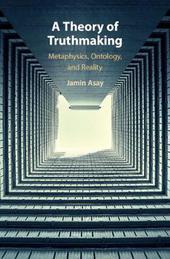
|
A Theory of Truthmaking: Metaphysics, Ontology, and Reality
Hardback
Main Details
| Title |
A Theory of Truthmaking: Metaphysics, Ontology, and Reality
|
| Authors and Contributors |
By (author) Jamin Asay
|
| Physical Properties |
| Format:Hardback | | Pages:306 | | Dimensions(mm): Height 235,Width 155 |
|
| Category/Genre | Philosophy
Philosophy - epistemology and theory of knowledge |
|---|
| ISBN/Barcode |
9781108499880
|
| Classifications | Dewey:121 |
|---|
| Audience | | Professional & Vocational | |
|---|
| Illustrations |
Worked examples or Exercises; 1 Line drawings, black and white
|
|
Publishing Details |
| Publisher |
Cambridge University Press
|
| Imprint |
Cambridge University Press
|
| Publication Date |
30 April 2020 |
| Publication Country |
United Kingdom
|
Description
The theory of truthmaking has long aroused skepticism from philosophers who believe it to be tangled up in contentious ontological commitments and unnecessary theoretical baggage. In this book, Jamin Asay shows why that suspicion is unfounded. Challenging the current orthodoxy that truthmaking's fundamental purpose is to be a tool for explaining why truths are true, Asay revives the conception of truthmaking as fundamentally an exercise in ontology: a means for coordinating one's beliefs about what is true and one's ontological commitments. He goes on to show how truthmaking connects to analyticity, truth, and realism, and how it contributes to debates over nominalism, presentism, mathematical objects, and fictional characters. His book is the most comprehensive exploration to date into what truthmaking is and how it contributes to metaphysical debates across philosophy, and will interest a wide range of readers in metaphysics and beyond.
Author Biography
Jamin Asay is Associate Professor of Philosophy at the University of Hong Kong. He is the author of The Primitivist Theory of Truth (Cambridge, 2013) and numerous articles on truth, truthmaking and realism.
Reviews'This is an engaging read: brisk, direct, and thoroughly enjoyable, with interesting and challenging arguments throughout. If you're interested in the philosophy of truth, you should read it.' Mark Jago, University of Nottingham
|